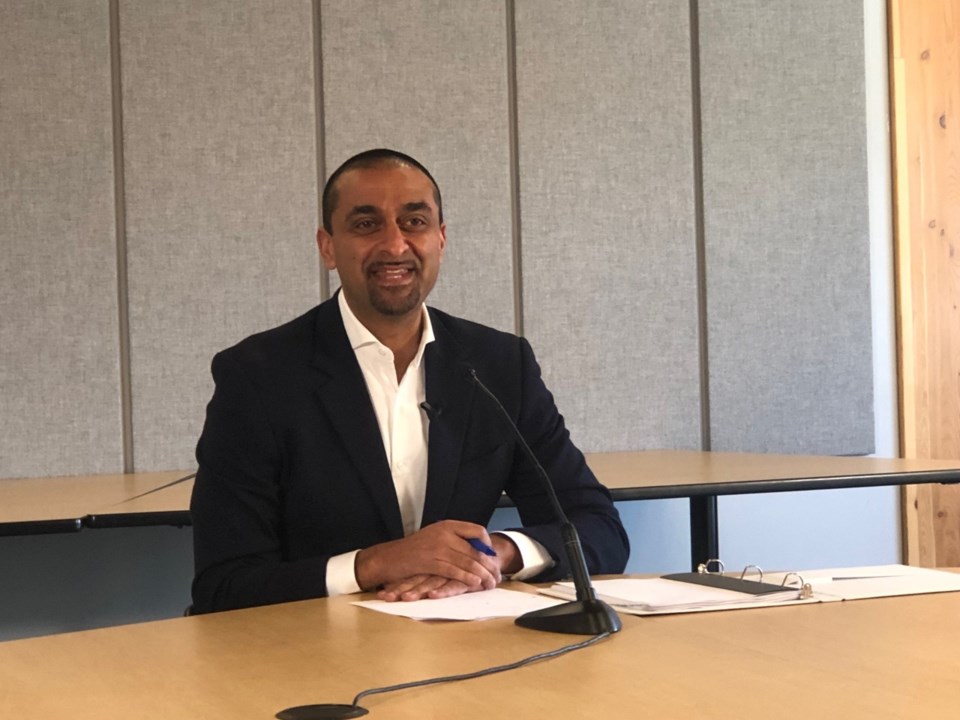Ravi Kahlon, B.C.’s minister of jobs and economic recovery, says Prince George is leading the way as B.C. continues its economic recovery through the pandemic.
Kahlon stopped in Prince George Wednesday on a tour of the interior of B.C. where he gave an update about the StrongerBC Economic Plan and the economy in northern B.C.
“We have a 103 per cent recovery rate. Three per cent more people are working today in B.C. than we had prior to the pandemic and Prince George is leading that way,” said Kahlon. “Prince George, with an unemployment rate of 3.2 per cent, is leading the country in the economic recovery but we know there’s a lot more work to do.”
He said economic recovery in the years ahead will need to address the challenges we have learned not only form the pandemic but from the fires, the floods, and heat domes.
The recent labour market outlook report highlighted that despite B.C.’s declining population there will be one million job openings in B.C. in the next 10 years and Kahlon said the challenge will be creating opportunities to bring more people into the workforce.
Khalon also addressed the challenges in forestry that Prince George and the region have been facing, including the recent closure of the PacificBio Energy pellet after nearly 30 years in business resulting in the loss of 50 jobs.
Forestry sector industry groups have also raised concerns that jobs will be lost following the B.C. government's announcement that it will place a moratorium on logging 2.6 million hectares of old growth or deemed at-risk forests.
While the deferrals are said to be temporary they could become permanent, depending in part on the support the deferrals received from First Nations involved in forestry.
“We know British Columbians want a sustainable forest industry for years ahead. The way that we have been harvesting our forests in the past has not been sustainable, they haven’t included Indigenous communities and that is vitally important for us,” said Kahlon.
He said the number of deferrals will be determined through an expert panel but the conversations that need to happen with Indigenous communities are happening now.
“We know for example many First Nations within this region have said we don’t want any deferrals and have strong working relationships with forest companies, with communities and are happy the way the practices of harvesting are happening, and we respect that and we acknowledge that in the decision making,” said Kahlon.
He said the government is working with each Nation to determine in respect to their traditional territories and if there are deferrals, the impact of those deferrals on the community.
“It means that communities will have a voice in what happens in their traditional territories. We have heard from some Nations that say we don’t want any deferrals and we have heard from some that say we want a complete deferral so it depends community by community.”
In terms of addressing layoffs within the forestry industry itself, which has been impacted by everything from beetle kill to wildfires and flooding, Kahlon said a key issue is ensuring workers have access to skills training so they may be able to take employment opportunities in other industries.
“The number one issue I find from employers right now is that they can’t find enough workers and that is across the province and is not isolated to one sector,” said Kahlon.
“We need to ensure that people have the skills training to take those employment opportunities, so those supports will be in place, as well as supporting communities that are looking to diversify their economies to create new opportunities.”
Kahlon also noted he sees huge opportunities for northern B.C. with increased connectivity and within the mining industry.
“We are seeing more businesses allowing their workers to work remotely and we are seeing more families move from metro Vancouver to smaller communities for a better lifestyle and they are starting their own business, so we are seeing growth opportunism with the expansion of connectivity,” said Kahlon.
“We think that mining is going to have a big increase in B.C. not only because we have the resources the world needs but because we want to have the ambitious climate change targets to achieve it is going to require resources and mining is going to be key.”
Kahlon said that working with local communities on their economic development goals and plans is a priority for the ministry.






